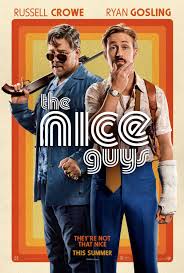 Across the “Lethal Weapon” movies and “Kiss Kiss Bang Bang,” few directors have been as consistently successful with action comedies as Shane Black. In his latest film “The Nice Guys,” he’s combined that penchant for irreverence and slick action into a hilarious, scandalous, seedy noir in the vein of “L.A. Confidential” and a Judd Apatow bromance.
Across the “Lethal Weapon” movies and “Kiss Kiss Bang Bang,” few directors have been as consistently successful with action comedies as Shane Black. In his latest film “The Nice Guys,” he’s combined that penchant for irreverence and slick action into a hilarious, scandalous, seedy noir in the vein of “L.A. Confidential” and a Judd Apatow bromance.
Russell Crowe and Ryan Gosling play private detectives trying to track down a missing teenage girl named Amelia (Margaret Qualley) in ‘70s Los Angeles, believing that her disappearance may be tied to the recent suicide of a notable porn star. Jackson Healy (Crowe) is an unlicensed tough specializing in roughing up perverts and collecting payments. Amelia is one of his clients, and he crosses paths with Holland March (Gosling) as March tries to locate her for a separate client. When Healy loses track of Amelia and gangsters come looking to kill her, Healy and March team up to protect her and uncover the scam brewing under the surface.
“You made a porno film where the point is the story?” March poses this question to Amelia as the complexities of their case get revealed. And in the same way, Black makes a commitment to story first above action or even comedy. Layered with intricate detail and mystery and littered with nostalgic, local color, “The Nice Guys” proves to be a great vehicle for Crowe and Gosling because it sets up stakes first.
It’s a buddy movie, yes, but the two of them together feed off their bad behavior and annoyance with the other. Crowe’s slack poise contrasts wonderfully with Gosling’s bouncy and twitchy façade. Crowe can be perfectly stoic and look as though he’s phoning it in, and then manage a perfectly timed sucker punch or even a spit take. Gosling on the other hand can barely keep himself composed, fighting with a bathroom stall door or fidgeting in a quiet panic as he bleeds profusely after trying to punch through a window. It looks so easy when other PIs do it!
But equally as engaging as “The Nice Guys’s” screwball mystery involves how Healy and March manage to redeem themselves amid their corrupt, wild, sleazy or idiotic behavior. The two each have their vices, with Healy being quick to anger and violence and March taking advantage of senile old folks or neglecting his tween daughter Holly (Angourie Rice).
Holly in particular brings the film together in surprising ways, with Healy forming a natural, yet unexpected bond with her as she looks to him to become a better person. Crowe of course has the dramatic depth to make such a character development convincing. But Gosling still manages the best chemistry. Holly sneaks along with Healy and March to a party at a porn star’s house and exclaims, “There are whores here and stuff!” Ever the perfect father, March says, “I told you not to say that word. Just say, ‘there are whores here.”
“The Nice Guys” doesn’t have too much to say about 2016, but this screwball trip back to the ‘70s is packed with nostalgia, sex, goofy fun…and stuff.
3 ½ stars

